Hitler

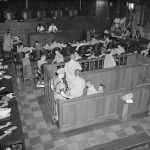 We all know that war is a nasty, messy, vicious event. Nevertheless, sometimes war is necessary. Unfortunately, in our world, evil exists, and sometimes the evil is in the form of a dictator, a nation, or a religious group. Wars might be fought differently, but the end result is the same…death and destruction. Still, most wars have an ending point. One side surrenders, and admits defeat. That might seem like the end of the story, but it isn’t. All too often the process of cleaning up the mess after the war, takes far longer than the war itself. In fact, sometimes the cleanup never really happens at all. Such was the case with landmines in Angola. These mines are a legacy of over four decades of fighting during a 14 year war of independence against its former colonial ruler of Portugal and another 30 years of civil war. Like people who put signs up to advertise a garage sale, sometimes they don’t remember where all the landmines were, or maybe they did, and simply didn’t care. Either way, the landmines were killing and maiming people…innocent people. That was the mission my 16th cousin once removed, Princess Diana took upon herself. She wanted an international ban on landmines. Her comments, which were made during a January 15, 1997 visit to Angola to see for herself some of the victims of landmines, were seen as out of step with government policy by the Junior Defense Minister, Earl Howe, who described the princess as a “loose cannon”, ill-informed on the issue of anti-personnel landmines. Nevertheless, Diana was right about the weapons of war that were left behind. The task of cleaning up the mess may have been a daunting one, but the result of leaving them behind was gruesome.
We all know that war is a nasty, messy, vicious event. Nevertheless, sometimes war is necessary. Unfortunately, in our world, evil exists, and sometimes the evil is in the form of a dictator, a nation, or a religious group. Wars might be fought differently, but the end result is the same…death and destruction. Still, most wars have an ending point. One side surrenders, and admits defeat. That might seem like the end of the story, but it isn’t. All too often the process of cleaning up the mess after the war, takes far longer than the war itself. In fact, sometimes the cleanup never really happens at all. Such was the case with landmines in Angola. These mines are a legacy of over four decades of fighting during a 14 year war of independence against its former colonial ruler of Portugal and another 30 years of civil war. Like people who put signs up to advertise a garage sale, sometimes they don’t remember where all the landmines were, or maybe they did, and simply didn’t care. Either way, the landmines were killing and maiming people…innocent people. That was the mission my 16th cousin once removed, Princess Diana took upon herself. She wanted an international ban on landmines. Her comments, which were made during a January 15, 1997 visit to Angola to see for herself some of the victims of landmines, were seen as out of step with government policy by the Junior Defense Minister, Earl Howe, who described the princess as a “loose cannon”, ill-informed on the issue of anti-personnel landmines. Nevertheless, Diana was right about the weapons of war that were left behind. The task of cleaning up the mess may have been a daunting one, but the result of leaving them behind was gruesome.
Of course, these weren’t the only messes that needed to be cleaned up after a war. There were buildings to be rebuilt, the dead to bury, the economy to build up, and the government often had to be restructured. The country might have been the enemy, but if things weren’t handled right after the surrender, the same evil people might move right back into power. Of course, cleaning up the mess…often known as policing the nation that has now surrendered, is no easy task either. Most people don’t want the winning army there. Their country is nothing like it used to be. Some believe that is a good thing, but it was still their home, and now everything feels…wrong. Their homes are destroyed, food is can be scarce…water too. Everything they have known for their whole life is gone. No wonder they don’t want the army there…or maybe they secretly do, because their home has become just a very scary place. I suppose that is why a part of the surrender agreements include restoration of the country, and the new government and police.
One more part of cleaning up the mess is the task of trying the perpetrators for their war crimes. That was the main reason that Hitler took his own life. He knew that he would be tried and convicted of the crimes he had committed, and he couldn’t face what would follow. He would have been left to the mercy of his countrymen, 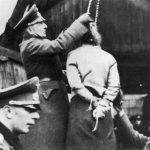
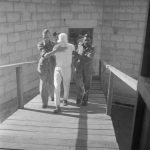 and he would have ended up being hung, like Saddam Hussein was for his war crimes. A dictator can’t brutally kill the people who he is in power over and not be hated…truly hated, no matter what the people act like when they are forced to act loyal. The trials for war crimes in many ways seems to the world, as if one nation is trying to be the world police. The United States has been accused of this before, but the reality remains, that someone has to try these evil criminals, and someone has to clean up the mess. In the absence of another nation to step up, the job usually falls to the United States.
and he would have ended up being hung, like Saddam Hussein was for his war crimes. A dictator can’t brutally kill the people who he is in power over and not be hated…truly hated, no matter what the people act like when they are forced to act loyal. The trials for war crimes in many ways seems to the world, as if one nation is trying to be the world police. The United States has been accused of this before, but the reality remains, that someone has to try these evil criminals, and someone has to clean up the mess. In the absence of another nation to step up, the job usually falls to the United States.
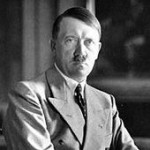
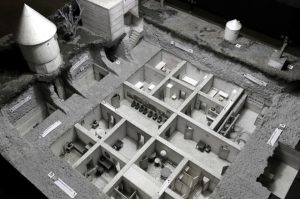 I read yesterday, that Adolf Hitler went into his underground bunker, known as the Führerbunker, with his mistress, Eva Braun on January 16, 1945. It was a coward’s move, so as not to have to face the Russians when they marched into town. He left his men to finish out the war in a losing battle, and when they wanted to surrender, they were rewarded with death. They were considered cowards, and yet Hitler made his last trip above ground on April 20, 1945, his 56th birthday. He took that opportunity, in the ruined garden of the Reich Chancellery, to award the Iron Cross to boy soldiers of the Hitler Youth, and then he retreated back to the safety of his bunker. On April 28th, Hitler learned that Reichsführer, SS Heinrich Himmler, who had left Berlin on April 20th was trying to discuss surrender terms with the Western Allies through Count Folke Bernadotte. To Hitler this was treason, and he was enraged. He ordered Himmler’s arrest. He also had Hermann Fegelein, Himmler’s SS representative at Hitler’s Headquarters in Berlin, shot. Those men were doing their best to stay alive, and Hitler sat in the safety of his bunker calling them traitors and cowards. Hitler’s bunker, while not elegant by any standard, was quite comfortable. He and Eva were well protected until the day they took their own lives on April 30, 1945…one day after their April 29th
I read yesterday, that Adolf Hitler went into his underground bunker, known as the Führerbunker, with his mistress, Eva Braun on January 16, 1945. It was a coward’s move, so as not to have to face the Russians when they marched into town. He left his men to finish out the war in a losing battle, and when they wanted to surrender, they were rewarded with death. They were considered cowards, and yet Hitler made his last trip above ground on April 20, 1945, his 56th birthday. He took that opportunity, in the ruined garden of the Reich Chancellery, to award the Iron Cross to boy soldiers of the Hitler Youth, and then he retreated back to the safety of his bunker. On April 28th, Hitler learned that Reichsführer, SS Heinrich Himmler, who had left Berlin on April 20th was trying to discuss surrender terms with the Western Allies through Count Folke Bernadotte. To Hitler this was treason, and he was enraged. He ordered Himmler’s arrest. He also had Hermann Fegelein, Himmler’s SS representative at Hitler’s Headquarters in Berlin, shot. Those men were doing their best to stay alive, and Hitler sat in the safety of his bunker calling them traitors and cowards. Hitler’s bunker, while not elegant by any standard, was quite comfortable. He and Eva were well protected until the day they took their own lives on April 30, 1945…one day after their April 29th 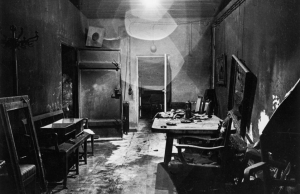
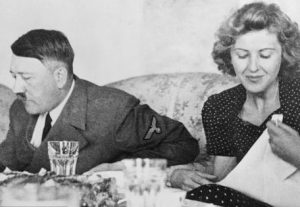 marriage. Their death came by cyanide poisoning, with Hitler’s accompanied by a self inflicted gunshot wound to the head. They did not want to face the possibility of a trial for the many war crimes he was responsible for.
marriage. Their death came by cyanide poisoning, with Hitler’s accompanied by a self inflicted gunshot wound to the head. They did not want to face the possibility of a trial for the many war crimes he was responsible for.
In what was proving to be a crumbling empire, Hitler’s death camp soldiers knew they too, were in trouble, the day after he went underground. On January 17, 1945, the Russians were approaching Auschwitz. The decision was made to evacuate most of its population and send them on a death march. It was the largest and the most notorious of the death marches. Just nine days before the Soviets arrived at the death camp at Auschwitz, the SS marched nearly 60,000 prisoners out of the camp toward Loslau, 39 miles away. There, they were put on freight trains to other camps. Approximately 15,000 prisoners died on the way, which is why it was called a death march. Loslau recorded a freezing -4°F and lower at the time the prisoners were arriving. Residents tried to help the prisoners, and many prisoners regained freedom between Auschwitz and Loslau, as the residents helped them escape. The prisoners who were left at the camp were liberated on 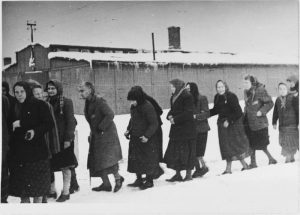
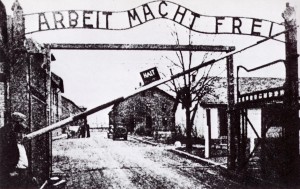 January 27, 1945, which is a day now commemorated as International Holocaust Remembrance Day. In years after the Holocaust, survivors, such as Primo Levi, Viktor Frankl, and Elie Wiesel, wrote memoirs of their experiences in Auschwitz, and the camp became a dominant symbol of the Holocaust. In 1947, Poland founded the Auschwitz-Birkenau State Museum on the site of Auschwitz I and II, and in 1979, it was named a UNESCO World Heritage Site.
January 27, 1945, which is a day now commemorated as International Holocaust Remembrance Day. In years after the Holocaust, survivors, such as Primo Levi, Viktor Frankl, and Elie Wiesel, wrote memoirs of their experiences in Auschwitz, and the camp became a dominant symbol of the Holocaust. In 1947, Poland founded the Auschwitz-Birkenau State Museum on the site of Auschwitz I and II, and in 1979, it was named a UNESCO World Heritage Site.
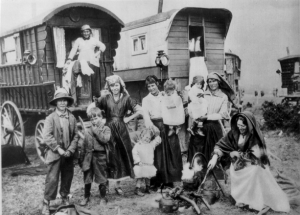 When we think of the horrors of the Holocaust, we think of millions of Jewish people who were murdered because they were Jewish. The horrible things Hitler did are so awful, that most of us can hardly bare to think about it at all. It is uncertain just when the Holocaust began, but the accepted date is January 30, 1933. That date is when Adolf Hitler was appointed German chancellor, setting in motion what would become the Nazi genocide against the Jews. On September 15, 1935, the Nuremberg Laws were enacted. The Nuremberg Laws were anti-Jewish statutes enacted by Germany, that were a major step in clarifying racial policy and removing Jewish influences from Aryan society. These laws, were the foundation on which the rest of Nazi racial policy hung.
When we think of the horrors of the Holocaust, we think of millions of Jewish people who were murdered because they were Jewish. The horrible things Hitler did are so awful, that most of us can hardly bare to think about it at all. It is uncertain just when the Holocaust began, but the accepted date is January 30, 1933. That date is when Adolf Hitler was appointed German chancellor, setting in motion what would become the Nazi genocide against the Jews. On September 15, 1935, the Nuremberg Laws were enacted. The Nuremberg Laws were anti-Jewish statutes enacted by Germany, that were a major step in clarifying racial policy and removing Jewish influences from Aryan society. These laws, were the foundation on which the rest of Nazi racial policy hung.
The Jewish people were not the only group of people who came to the attention of Hitler’s insane mind either. Under the rule of Adolf Hitler, a supplementary decree to the Nuremberg Laws was issued on November 26, 1935, defining Gypsies as “enemies of the race-based state”, the same category as Jews. The Nuremberg racial 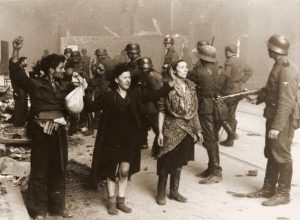 laws of September 15, 1935, “Law for the Protection of German Blood and Honor” and “Reich Citizenship Law” did not explicitly mention Gypsies, but in commentaries interpreting these laws, “Gypsies were included, along with Jews and Negros, as racially distinctive minorities with alien blood. As such, their marriage to Aryans was prohibited.” Like the Jews, the Gypsies were also deprived of their civil rights. Hitler viewed Jews and Gypsies as a defective race, in fact he viewed all non-white people as defective. I suppose this view was what originally justified Hitler’s brutal murder of 6 million Jews and who knows how many people of other races. On this day, November 15, 1943, Heinrich Himmler, who was the Reichsführer of the Schutzstaffel (Protection Squadron, or SS), and a leading member of the Nazi Party (NSDAP) of Nazi Germany ordered that Gypsies and those of mixed Gypsy blood are to be put on “the same level as Jews and placed in concentration camps.”
laws of September 15, 1935, “Law for the Protection of German Blood and Honor” and “Reich Citizenship Law” did not explicitly mention Gypsies, but in commentaries interpreting these laws, “Gypsies were included, along with Jews and Negros, as racially distinctive minorities with alien blood. As such, their marriage to Aryans was prohibited.” Like the Jews, the Gypsies were also deprived of their civil rights. Hitler viewed Jews and Gypsies as a defective race, in fact he viewed all non-white people as defective. I suppose this view was what originally justified Hitler’s brutal murder of 6 million Jews and who knows how many people of other races. On this day, November 15, 1943, Heinrich Himmler, who was the Reichsführer of the Schutzstaffel (Protection Squadron, or SS), and a leading member of the Nazi Party (NSDAP) of Nazi Germany ordered that Gypsies and those of mixed Gypsy blood are to be put on “the same level as Jews and placed in concentration camps.”
Hitler’s decision to include the Gypsies, and the ensuing murders of up to 500,000 Romani Gypsies, became known as the Romani Holocaust, or Porajmos, which means cutting, fragmentation, or destruction; or 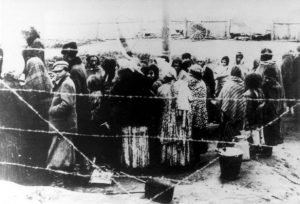 Samudaripen, which means mass killing. It was Nazi Germany and its allies planned and attempted effort to exterminate the Romani Gypsy people of Europe. Some historians put the death toll as high as 1.5 million. In 1982, West Germany formally recognized that genocide had been committed against the Romani. In 2011 the Polish Government passed a resolution for the official recognition of August 2nd as a day of commemoration of the genocide. As I was researching this horrific genocide, I began to wonder how it was that I had never heard about it before. Was I living under a rock? In reality, I doubt if it was in any of the history books of my time, because no one admitted that it happened until 1982, at the earliest.
Samudaripen, which means mass killing. It was Nazi Germany and its allies planned and attempted effort to exterminate the Romani Gypsy people of Europe. Some historians put the death toll as high as 1.5 million. In 1982, West Germany formally recognized that genocide had been committed against the Romani. In 2011 the Polish Government passed a resolution for the official recognition of August 2nd as a day of commemoration of the genocide. As I was researching this horrific genocide, I began to wonder how it was that I had never heard about it before. Was I living under a rock? In reality, I doubt if it was in any of the history books of my time, because no one admitted that it happened until 1982, at the earliest.
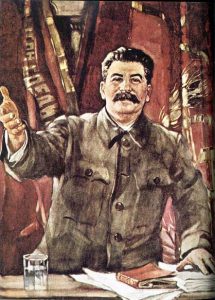 Imagine being in a country where being afraid is a crime. I’m sure you are wondering how that is possible…in any country, but I assure you, it is. That was the case on this day, July 27, 1943 in Russia. Joseph Stalin was the premier and dictator of Russia at that time in history, and Adolf Hitler was the dictator of Germany. The Germans were advancing into Russian territory, and Stalin was determined to stop them, no matter the cost.
Imagine being in a country where being afraid is a crime. I’m sure you are wondering how that is possible…in any country, but I assure you, it is. That was the case on this day, July 27, 1943 in Russia. Joseph Stalin was the premier and dictator of Russia at that time in history, and Adolf Hitler was the dictator of Germany. The Germans were advancing into Russian territory, and Stalin was determined to stop them, no matter the cost.
Hitler had become quite bold because of the early successes against Russia in his goal of taking Leningrad and Stalingrad. The attack on Stalingrad proved, however, that the Russians had superior manpower and it was an enormous drain on German resources and troop strength. The Germans were repulsed by a fierce Soviet fighting force, that had been reinforced with more men and materials. Hitler made the decision to turn his sights to Leningrad.
Stalin needed to make sure his force wouldn’t back down…no matter what happened. The motivation to stand 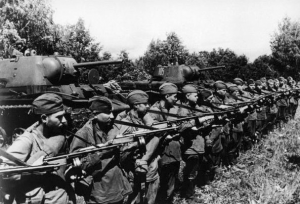 their ground needed to apply to both officers and civilians alike, or he was sure that Leningrad would be lost. That was when Stalin decided to put order number 227 into effect. So, what was order number 227? The order declared, “Panic makers and cowards must be liquidated on the spot. Not one step backward without orders from higher headquarters! Commanders…who abandon a position without an order from higher headquarters are traitors to the Fatherland.” Basically the order said that no one…not one person would be a coward. The order became known as the “not one step backward” order. The military personnel, as well as civilians were forced to fight for their city.
their ground needed to apply to both officers and civilians alike, or he was sure that Leningrad would be lost. That was when Stalin decided to put order number 227 into effect. So, what was order number 227? The order declared, “Panic makers and cowards must be liquidated on the spot. Not one step backward without orders from higher headquarters! Commanders…who abandon a position without an order from higher headquarters are traitors to the Fatherland.” Basically the order said that no one…not one person would be a coward. The order became known as the “not one step backward” order. The military personnel, as well as civilians were forced to fight for their city.
I think I can understand what Stalin was doing, but it seems such a drastic measure to take. Still, while some 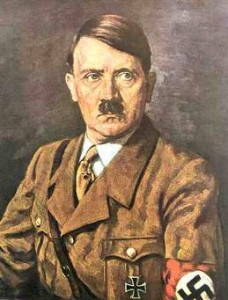 people might fight the enemy to the end, others might decide that their city wasn’t worth their life. If the penalty for backing off was instant liquidation, then standing and fighting became the only way to have a chance at life. In my opinion, that as far as ways to gain loyalty goes, this was not the best of plans, but then forced loyalty seldom is. Still, one must never underestimate the love a patriot feels for their country. The “not one step backward” order was virtually unnecessary, in that on the day the order was issued, the Russian peasants and other supporters in the Leningrad region killed a German official, Adolf Beck, whose job was to send agricultural products from occupied Russia to Germany and to German troops. The Russian patriots also set fire to the granaries and barns in which the stash of agricultural products was stored before transport. A partisan pamphlet issued an order of its own: “Russians! Destroy the German landowners. Drive the Germans from the land of the Soviets!” I guess Stalin had misjudged his peoples’ loyalty.
people might fight the enemy to the end, others might decide that their city wasn’t worth their life. If the penalty for backing off was instant liquidation, then standing and fighting became the only way to have a chance at life. In my opinion, that as far as ways to gain loyalty goes, this was not the best of plans, but then forced loyalty seldom is. Still, one must never underestimate the love a patriot feels for their country. The “not one step backward” order was virtually unnecessary, in that on the day the order was issued, the Russian peasants and other supporters in the Leningrad region killed a German official, Adolf Beck, whose job was to send agricultural products from occupied Russia to Germany and to German troops. The Russian patriots also set fire to the granaries and barns in which the stash of agricultural products was stored before transport. A partisan pamphlet issued an order of its own: “Russians! Destroy the German landowners. Drive the Germans from the land of the Soviets!” I guess Stalin had misjudged his peoples’ loyalty.
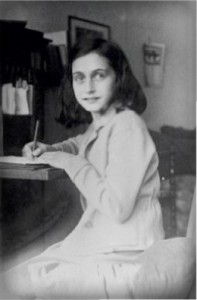 I am not related to Anne Frank, but her story is one that, while I cannot relate to personally, nevertheless touches me deeply. Anne, like another woman who I have long respected, Corrie ten Boom, went through some of the deepest forms of hatred there can possibly exist in this world. Anne was a Jewish girl, just turning 13 on this day, June 12, 1942, and Corrie ten Boom was a Dutch Christian woman who helped as many Jewish people as she could during the ugliness that was Hitler’s reign, and that would eventually take Anne’s life. The two women never met in person, to my knowledge, but while Anne may never have heard of Corrie, I’m certain that Corrie heard of Anne. The plight of the Jewish people touched Corrie ten Boom deeply too…deeply enough that she and her family risked their lives trying to hide the Jewish people from Hitler’s men, and act that eventually precipitated their capture and imprisonment, because it was against the law to help the Jewish people.
I am not related to Anne Frank, but her story is one that, while I cannot relate to personally, nevertheless touches me deeply. Anne, like another woman who I have long respected, Corrie ten Boom, went through some of the deepest forms of hatred there can possibly exist in this world. Anne was a Jewish girl, just turning 13 on this day, June 12, 1942, and Corrie ten Boom was a Dutch Christian woman who helped as many Jewish people as she could during the ugliness that was Hitler’s reign, and that would eventually take Anne’s life. The two women never met in person, to my knowledge, but while Anne may never have heard of Corrie, I’m certain that Corrie heard of Anne. The plight of the Jewish people touched Corrie ten Boom deeply too…deeply enough that she and her family risked their lives trying to hide the Jewish people from Hitler’s men, and act that eventually precipitated their capture and imprisonment, because it was against the law to help the Jewish people.
Hitler hated the Jewish people, and in reality, was probably afraid of them…hence his need to rid himself of them. Hitler was insane. During the time that Hitler was taking the Jewish people prisoner, and killing them, a young girl named Anne Frank was turning 13, and was given a diary for her birthday. Having been a young girl with a diary, I can relate to the excitement of getting a diary in which to record your deepest thoughts, hopes, dreams, and secrets. I can also say that at that time, I felt like my life was relatively boring, and so writing in my diary quickly became a chore, and was soon forgotten. I have to wonder if Anne’s diary might have suffered the same fate…had things been different. Most kids get pretty bored with writing down their thoughts everyday, but Anne’s life was about to change forever. She was about to spend the next two years in hiding in a secret room in her father’s office, along with four other families, dependent on loving Christians for their every need.
The Nazis were coming, and they were determined to kill every Jewish person they could. Anne and her family had to go into hiding. And so it was, that a young girl trapped behind a wall that led to a secret room, where silence was essential for survival, began to write down her thoughts and experiences in what would become the most read diary in history. Anne would not live to become an adult, to marry, or to have children, and yet, she would go on to become one of the most well known children in history. My great aunt, Bertha Schumacher Hallgren said that anyone could become a famous writer, if they just wrote about the events of their life, and colored it with some information about the time in history in which they lived. That is exactly what Anne Frank 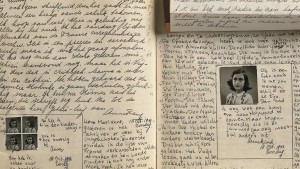 did. I have to think that she assumed that no one would care about her little life spent in hiding, much less about how a 13 year old girl felt about it, but after she died of Typhus in a prison camp called Bergen-Belsen, just one month before the end of the war, they did care. The Christian friends found her diary after their capture, and kept it in the hope of giving it back to her. Her father lived through that horrible time, and the diary was returned to him. He had it published in her honor in 1947. The book was called “The Diary of a Young Girl,” and has been made into a movie too, because in the end, it told the world about a very ugly time in history.
did. I have to think that she assumed that no one would care about her little life spent in hiding, much less about how a 13 year old girl felt about it, but after she died of Typhus in a prison camp called Bergen-Belsen, just one month before the end of the war, they did care. The Christian friends found her diary after their capture, and kept it in the hope of giving it back to her. Her father lived through that horrible time, and the diary was returned to him. He had it published in her honor in 1947. The book was called “The Diary of a Young Girl,” and has been made into a movie too, because in the end, it told the world about a very ugly time in history.
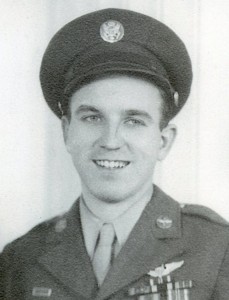 It’s hard for me to think about D-Day, without wondering what things were going through my dad, Allen Spencer’s mind on that day. Each branch of the military had their own part to play and each was in much danger. I suppose it’s possible that the men on the ground were in the most danger, but in reality, anyone who was involved that day faced grave danger. Soldiers could be shot and killed, ships could be sunk, and planes could be shot down. No matter how the attack came, death was often the result, and in battle it was inevitable.
It’s hard for me to think about D-Day, without wondering what things were going through my dad, Allen Spencer’s mind on that day. Each branch of the military had their own part to play and each was in much danger. I suppose it’s possible that the men on the ground were in the most danger, but in reality, anyone who was involved that day faced grave danger. Soldiers could be shot and killed, ships could be sunk, and planes could be shot down. No matter how the attack came, death was often the result, and in battle it was inevitable.
My dad was a young man of just 20 years. That is the age of my two oldest grandchildren, and I simply cannot imagine either of them being in that position. Of course, they could handle it, because twenty year olds have been fighting wars for as long as wars have been fought. It is me, and my mind, that can’t wrap itself around the idea of them being in an airplane providing air support over a battlefield. For my dad, every mission held an adrenalin rush, a degree of excitement, and a large degree of dread, mixed with the need to push back fear. Flying in the B-17G Bomber was an exciting thing for him, but unfortunately it had to 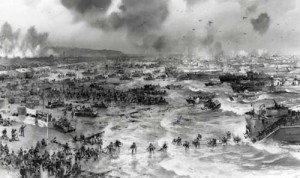 be mixed with the reality of the fact that those bombs were killing people…even if they were the enemy. They often had no say in the matter, they were an enemy of the Allied Forces simply because they lived in the country they did.
be mixed with the reality of the fact that those bombs were killing people…even if they were the enemy. They often had no say in the matter, they were an enemy of the Allied Forces simply because they lived in the country they did.
The air war was vastly different from the ground war, but that didn’t make either more of less dangerous. The Luftwaffe was not widely used on D-Day, but did come racing in over the following days. The weather was bad that first day, and that was definitely to the advantage of the Allied troops. Nevertheless, there were German forces involved, and without air support, they could not have pulled off the victory they did at Normandy. The planes that were there to provide air support, were basically magnets for the 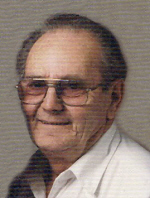 Luftwaffe, and any other enemy forces on the ground. Flying over Normandy was not a task to be taken lightly. Their job was to keep the bombers, tanks, and other soldiers off of the ground troops. The men risked their lives every second that they were in the air. The men on the ground were so vulnerable, and it was imperative that they have good air cover to keep as much enemy fire off of them as possible. It was very clear that without the air support, D-Day would not have been possible.
Luftwaffe, and any other enemy forces on the ground. Flying over Normandy was not a task to be taken lightly. Their job was to keep the bombers, tanks, and other soldiers off of the ground troops. The men risked their lives every second that they were in the air. The men on the ground were so vulnerable, and it was imperative that they have good air cover to keep as much enemy fire off of them as possible. It was very clear that without the air support, D-Day would not have been possible.
I am very proud of the part my dad played in D-Day, as I am of men like my Uncle Jim Wolfe, who was one of those men on the ground on that fateful day. Their job was a very dangerous one, and many of them would not see the sun set that night, but they had a job to do, and so they went out to battle for the freedom of those who were oppressed by the evil that was Hitler. It is a battle we will never forget, nor will we forget the men who fought there, especially those who gave all.
 When we look at the reasons that the United States entered World War II, we think of the Japanese attack on Pearl Harbor, and we would be correct, but there was another dictator who committed so many atrocities during and before World War II, that it seems to me inevitable that we would have had to make that decision sooner or later. Adolf Hitler was a German politician, the leader of the Nazi Party, elected Chancellor of Germany from 1933 to 1945, and Führer, or leader of Nazi Germany from 1934 to 1945. One of his worst acts as Führer of Nazi Germany, was when he initiated World War II in Europe with the invasion of Poland in September 1939 and the worst act was, of course, the Holocaust.
When we look at the reasons that the United States entered World War II, we think of the Japanese attack on Pearl Harbor, and we would be correct, but there was another dictator who committed so many atrocities during and before World War II, that it seems to me inevitable that we would have had to make that decision sooner or later. Adolf Hitler was a German politician, the leader of the Nazi Party, elected Chancellor of Germany from 1933 to 1945, and Führer, or leader of Nazi Germany from 1934 to 1945. One of his worst acts as Führer of Nazi Germany, was when he initiated World War II in Europe with the invasion of Poland in September 1939 and the worst act was, of course, the Holocaust.
During the Holocaust, an insane Hitler, decided that the Jewish people were Untermenschen, or sub-human and socially undesirable, and determined in his heart to kill them. His first move in that direction was to begin rounding them up and placing them in prison camps. And one of the worst was Auschwitz. For a time, Hitler only placed the men in Auschwitz, but then on March 26, 1942, the first women prisoners arrived at Auschwitz.  Of course, Hitler’s intent was always to put the prisoners to death, but he decided to use them in whatever capacity he felt necessary and useful, before the time came to kill them. Since he considered the sub-human, he felt no guilt making them slaves. The prisoners were forced to work long hours, and were also used for medical experimentation. When the prisoners entered the camp, they were strip searched, male and female alike, and forced to stand naked in front of the guards during that time. It didn’t matter how cold they were. They did not count in the eyes of the Germans, because they were Untermenschen…sub-human. As a woman, I can only imagine how these first female prisoners must have felt. They were already very much aware that the Germans did not respect their race, so why would they feel differently about the fact that they were women. It would have been a very scary time. I’m sure they did not know if they would be raped and then killed, or what would happen to them. Their entry into the prison camp had already proven that they were nothing in the eyes of their captors.
Of course, Hitler’s intent was always to put the prisoners to death, but he decided to use them in whatever capacity he felt necessary and useful, before the time came to kill them. Since he considered the sub-human, he felt no guilt making them slaves. The prisoners were forced to work long hours, and were also used for medical experimentation. When the prisoners entered the camp, they were strip searched, male and female alike, and forced to stand naked in front of the guards during that time. It didn’t matter how cold they were. They did not count in the eyes of the Germans, because they were Untermenschen…sub-human. As a woman, I can only imagine how these first female prisoners must have felt. They were already very much aware that the Germans did not respect their race, so why would they feel differently about the fact that they were women. It would have been a very scary time. I’m sure they did not know if they would be raped and then killed, or what would happen to them. Their entry into the prison camp had already proven that they were nothing in the eyes of their captors.
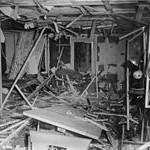 Between 1939 and 1945, there were many plans to try to assassinate Hitler. The most well known, Operation Valkyrie, which came from within Germany and was at least partly driven by the increasing prospect of a German defeat in the war. On July 20, 1944, Claus von Stauffenberg planted a bomb in one of Hitler’s headquarters…known as the Wolf’s Lair at Rustenburg. Hitler survived because staff officer Heinz Brandt moved the briefcase containing the bomb behind a leg of the heavy conference table. When the bomb exploded, the table deflected much of the blast. Later, Hitler ordered savage reprisals resulting in the execution of more than 4,900 people. In the end, he would take his own life, in an effort not to be taken alive. Not a bad thing if you ask me, because the world is truly well rid of him.
Between 1939 and 1945, there were many plans to try to assassinate Hitler. The most well known, Operation Valkyrie, which came from within Germany and was at least partly driven by the increasing prospect of a German defeat in the war. On July 20, 1944, Claus von Stauffenberg planted a bomb in one of Hitler’s headquarters…known as the Wolf’s Lair at Rustenburg. Hitler survived because staff officer Heinz Brandt moved the briefcase containing the bomb behind a leg of the heavy conference table. When the bomb exploded, the table deflected much of the blast. Later, Hitler ordered savage reprisals resulting in the execution of more than 4,900 people. In the end, he would take his own life, in an effort not to be taken alive. Not a bad thing if you ask me, because the world is truly well rid of him.
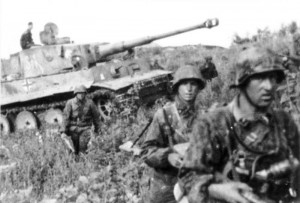 When the Germans invaded the Soviet Union in early July of 1943, they concentrated their forces near the city of Kursk in Western Russia. This was the site of a 150 mile wide Soviet resistance pocket that jutted 100 miles into the German lines. When the attack began on July 5th, the Germans had 38 divisions, of which, nearly half were armored. The Germans began their attack coming in from the north and the south, in an effort to cut off and surround the Soviet troops. Unfortunately for them, they had sorely misjudged the Soviet forces. Even though the Soviets were not really prepared for this invasion, they did have better tanks and air support than they had in previous battles. The fighting was bitter, but soon the Soviets had destroyed as much as 40 percent of the German armor, which included their new Mark VI Tiger tanks. I’m sure this must have been a shock to the Germans, who thought this tank was going to be their best tank ever, but like the Bismarck back in 1941, they found out that these new tanks were no match for what the Russians brought out.
When the Germans invaded the Soviet Union in early July of 1943, they concentrated their forces near the city of Kursk in Western Russia. This was the site of a 150 mile wide Soviet resistance pocket that jutted 100 miles into the German lines. When the attack began on July 5th, the Germans had 38 divisions, of which, nearly half were armored. The Germans began their attack coming in from the north and the south, in an effort to cut off and surround the Soviet troops. Unfortunately for them, they had sorely misjudged the Soviet forces. Even though the Soviets were not really prepared for this invasion, they did have better tanks and air support than they had in previous battles. The fighting was bitter, but soon the Soviets had destroyed as much as 40 percent of the German armor, which included their new Mark VI Tiger tanks. I’m sure this must have been a shock to the Germans, who thought this tank was going to be their best tank ever, but like the Bismarck back in 1941, they found out that these new tanks were no match for what the Russians brought out.
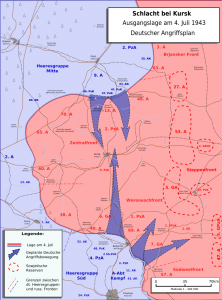
The Battle of Kursk was quite the battle. It involved 6,300 tanks, two million men, and 5,000 aircraft. It would be the largest tank battle in history, and it would end with the German offensive being driven back by the Soviets. The cost to the Germans was heavy, and the battle would be the beginning of the end for the Germans in Russia. The retreated as far as they were allowed, but Hitler was not really willing to let the retreat much. It was just another part of his insanity. He thought he could outlast the Russians. He had not learned from Bismarck or from Napoleon. It’s not surprising really. Hitler’s insanity honestly made him believe that he was invincible, a fatal mistake…at least in that he couldn’t accept the ultimate failure and so took his own life. The Battle of Kursk ended on July 13, 1943, and it did indeed mark the beginning of the end of the German invasion of Russia.
When I think of wars, for some reason I don’t think of tanks. Oh, I have seen the war movies and all, but tanks just seem clunky and awkward, and so not an efficient weapon of war in my mind. I suppose that if I know as much about tanks as my brother-in-law, Ron Schulenberg, who served in Desert Storm and was trained in the 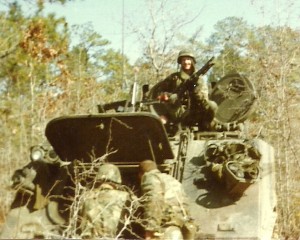 use of tanks knows, I might think they were more of a serious weapon. That is something I might have to discuss with him in the near future. The weapons used in wars are varied, and each one serves a purpose. Of course, each side tries to come up with a weapon that is far better than their opponent, and in the end, it is a matter of having the best weapon between the two enemies, and which side is able to use the weapons available to them. On this day, July 13, 1943 the Germans found out that the weapons the Russians had and their ability to use them would prove to be the undoing of their invasion. In the beginning of August, the Soviets began a major offensive around the Kursk area, and within weeks the Germans were in retreat all along the eastern front.
use of tanks knows, I might think they were more of a serious weapon. That is something I might have to discuss with him in the near future. The weapons used in wars are varied, and each one serves a purpose. Of course, each side tries to come up with a weapon that is far better than their opponent, and in the end, it is a matter of having the best weapon between the two enemies, and which side is able to use the weapons available to them. On this day, July 13, 1943 the Germans found out that the weapons the Russians had and their ability to use them would prove to be the undoing of their invasion. In the beginning of August, the Soviets began a major offensive around the Kursk area, and within weeks the Germans were in retreat all along the eastern front.
 Anyone who knows much about Nazi Germany, knows that Adolf Hitler was insane. His hatred for the Jewish people was nothing less that insanity, because he had no valid reason to hate them. Nevertheless, the Holocaust did happen. Hitler did kill between five and six million Jews during his reign of terror. Many people thought that the Jews were the only target Hitler had too, but that wasn’t so. Hitler wanted to kill anyone who annoyed, inconvenienced, or even remotely bothered him. On this day, July 8, 1943, upon the German army’s invasion of Pskov, 180 miles from Leningrad, Russia, the chief of the German army general staff, General Franz Halder, records in his diary Hitler’s plans for Moscow and Leningrad: “To dispose fully of their population, which otherwise we shall have to feed during the winter.” Hitler planned to level both cities, or at least kill everyone in them, because he didn’t want to have to feed the prisoners during the long winter months! And for no other reason. Most armies at least set up prisoner of war camps, which while not terribly humane, gave some semblance of an attempt to be humane. I know that everyone complains about how the United States treats prisoners of war, but there really is no comparison, when you view the way Hitler and some other terrible dictators treat prisoners of war. Humane treatment is a pipe dream for prisoners of dictators.
Anyone who knows much about Nazi Germany, knows that Adolf Hitler was insane. His hatred for the Jewish people was nothing less that insanity, because he had no valid reason to hate them. Nevertheless, the Holocaust did happen. Hitler did kill between five and six million Jews during his reign of terror. Many people thought that the Jews were the only target Hitler had too, but that wasn’t so. Hitler wanted to kill anyone who annoyed, inconvenienced, or even remotely bothered him. On this day, July 8, 1943, upon the German army’s invasion of Pskov, 180 miles from Leningrad, Russia, the chief of the German army general staff, General Franz Halder, records in his diary Hitler’s plans for Moscow and Leningrad: “To dispose fully of their population, which otherwise we shall have to feed during the winter.” Hitler planned to level both cities, or at least kill everyone in them, because he didn’t want to have to feed the prisoners during the long winter months! And for no other reason. Most armies at least set up prisoner of war camps, which while not terribly humane, gave some semblance of an attempt to be humane. I know that everyone complains about how the United States treats prisoners of war, but there really is no comparison, when you view the way Hitler and some other terrible dictators treat prisoners of war. Humane treatment is a pipe dream for prisoners of dictators.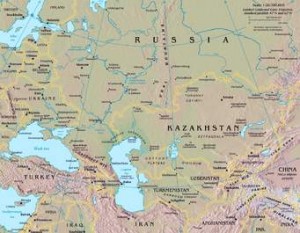
Hitler launched a massive invasion of the Soviet Union on June 22, with over 3 million men. He was highly successful, due in large part to a disorganized and unsuspecting Russian army. By July 8, they had captured 280,000 Soviet prisoners and almost 2,600 tanks were destroyed. The army was already a couple of hundred miles inside Soviet territory. Stalin was in a panic. He was so angry that he began executing generals who had failed to stop the invaders.
Halder, who was Hitler’s chief of staff, had been keeping a diary of the day-to-day decision making process. As time went on, Hitler became emboldened by his successes in Russia. Halder recorded that the “Fuhrer is firmly determined to level Moscow and Leningrad to the ground.” Halder also records the reality of Hitler’s underestimation of the Russian army’s numbers and the bitter fighting within Hitler’s own armies about strategy. Halder and some of the others wanted to make straight for the capital, Moscow. But Hitler wanted to meet up with Field Marshal Wilhelm Leeb’s army group, 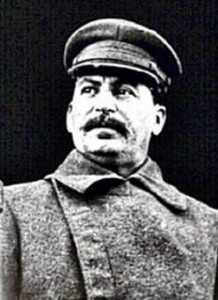 which was making its way toward Leningrad. And Hitler was, after all, in charge. But, the advantage Hitler had against the Soviets would not last very long. Winter was approaching and so was the advantage such conditions would give the Russians. The Russians were used to the severe Russian winters, and Hitler’s men were not. Like Napoleon before them, the Germans would soon find that they weren’t prepared for the Russian winter, and subsequent winters. And yet, Hitler thought he had learned from Napoleon. He ordered his troops to hold their ground. Which meant that during the Winter War, the German army was not able to pull back to more defensible positions. Consequently, the Russians were able to launch a series of counter-attacks during that first winter. These attacks cutoff some German forces, inflicted worse casualties than the Germans could inflict, but more importantly allowed the Russians to rebuild their army. The winter months proved to be just as detrimental for Hitler as they had for Napoleon. He was insane to even try such an attack.
which was making its way toward Leningrad. And Hitler was, after all, in charge. But, the advantage Hitler had against the Soviets would not last very long. Winter was approaching and so was the advantage such conditions would give the Russians. The Russians were used to the severe Russian winters, and Hitler’s men were not. Like Napoleon before them, the Germans would soon find that they weren’t prepared for the Russian winter, and subsequent winters. And yet, Hitler thought he had learned from Napoleon. He ordered his troops to hold their ground. Which meant that during the Winter War, the German army was not able to pull back to more defensible positions. Consequently, the Russians were able to launch a series of counter-attacks during that first winter. These attacks cutoff some German forces, inflicted worse casualties than the Germans could inflict, but more importantly allowed the Russians to rebuild their army. The winter months proved to be just as detrimental for Hitler as they had for Napoleon. He was insane to even try such an attack.
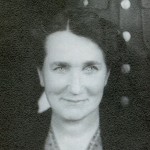 As time marched forward toward the United States entering World War II, many people were afraid for the lives of their sons. My dad’s mother, who had two sons, was among them. Things were really heating up while my dad was working in California, and the family really wanted him come home. The word was that any young men 18 to 20 years of age were going to be deployed by Christmas 1942, putting my dad and my Uncle Bill squarely in that group. It was a fearful time in our country. People didn’t want their sons to go to the war, but they knew that Hitler had to be stopped. The things Hitler was doing were so horrible that everyone knew that he must not be allowed to take any more countries over. He was completely insane and dead set on controlling the whole world. They knew that while the fear of sending their sons into battle was almost more than they could possibly bear, it was also going to be the only way to stop this horrible man.
As time marched forward toward the United States entering World War II, many people were afraid for the lives of their sons. My dad’s mother, who had two sons, was among them. Things were really heating up while my dad was working in California, and the family really wanted him come home. The word was that any young men 18 to 20 years of age were going to be deployed by Christmas 1942, putting my dad and my Uncle Bill squarely in that group. It was a fearful time in our country. People didn’t want their sons to go to the war, but they knew that Hitler had to be stopped. The things Hitler was doing were so horrible that everyone knew that he must not be allowed to take any more countries over. He was completely insane and dead set on controlling the whole world. They knew that while the fear of sending their sons into battle was almost more than they could possibly bear, it was also going to be the only way to stop this horrible man.
The letters from home to my dad in California were filled with worried questions. They had heard rumors of the impending deployment back home in Holyoke, Minnesota, and were desperately hoping that what they heard in that small town was wrong. They questioned my dad, as to why he thought he would be going so soon. Uncle Bill and Dad had both decided 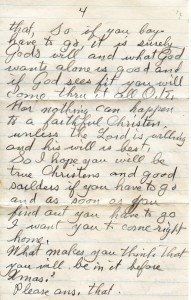 that if one was called to go, the other would join up too. I’m sure they were thinking that if they went together, they could watch each other’s back. In the end, that was not to be, because Uncle Bill had flat feet and a hernia that needed to be repaired. It was a devastating blow to him. He wanted so desperately to be there with his little brother. He had always been there for him, to protect him, and it seemed impossible that he couldn’t do that this time. He was scared for his little brother. He even tried to get him to take welding classes, because he mistakenly thought that my dad wouldn’t have to go if he was working in the shipyards. I don’t know if dad took the classes or not…he did at some point, because he worked as a welder for many years…but if he did, it did no good, because they needed men in the war zones, and that was more important to the country. In the end, he chose the Army Air Force, and went to the war, did his duty to his country and the world, and he lived!!
that if one was called to go, the other would join up too. I’m sure they were thinking that if they went together, they could watch each other’s back. In the end, that was not to be, because Uncle Bill had flat feet and a hernia that needed to be repaired. It was a devastating blow to him. He wanted so desperately to be there with his little brother. He had always been there for him, to protect him, and it seemed impossible that he couldn’t do that this time. He was scared for his little brother. He even tried to get him to take welding classes, because he mistakenly thought that my dad wouldn’t have to go if he was working in the shipyards. I don’t know if dad took the classes or not…he did at some point, because he worked as a welder for many years…but if he did, it did no good, because they needed men in the war zones, and that was more important to the country. In the end, he chose the Army Air Force, and went to the war, did his duty to his country and the world, and he lived!!
For some time now, I thought that the main reason my dad’s letters home were always upbeat and positive was so that he could protect his mother…keep her from worrying about how bad things were. Now, after reading her letters to him, and the letters from his brother and sisters, talking about how worried their mother was, I realized that he wasn’t trying to keep her from worrying…she had already voiced those fears…she was already in the middle of serious worry, and now she was in the middle of praying that her boys wouldn’t have to go, and if they did…please dear Lord, take care of them and bring them home to her!!
It is hard enough to go into battle or to send your son into battle…to deal with the fear in your own heart…much less to know that your soldier was scared…and for the soldier, to know that 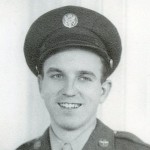 your family is scared. Knowing my dad like I do, I know that he was in the process of pushing his fear back, putting his faith in God, and setting his mother’s worried mind at ease. He knew he could not stop what was coming, but the hardest thing to accept was that he couldn’t really stop his mother’s fears…no matter how excited, positive, or fearless he made his letters sound. And, that tore him up more than anything he would face in the war. The days leading up to, and during World War II, were filled with the worries and fears of a nation. The letters to the soldiers and home from the war, were carefully worded so as to try to alleviate the fears that could not be alleviated until the deployed loved ones were home again.
your family is scared. Knowing my dad like I do, I know that he was in the process of pushing his fear back, putting his faith in God, and setting his mother’s worried mind at ease. He knew he could not stop what was coming, but the hardest thing to accept was that he couldn’t really stop his mother’s fears…no matter how excited, positive, or fearless he made his letters sound. And, that tore him up more than anything he would face in the war. The days leading up to, and during World War II, were filled with the worries and fears of a nation. The letters to the soldiers and home from the war, were carefully worded so as to try to alleviate the fears that could not be alleviated until the deployed loved ones were home again.

